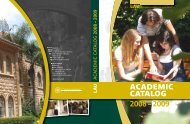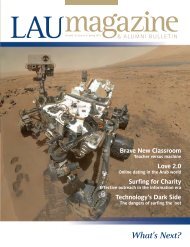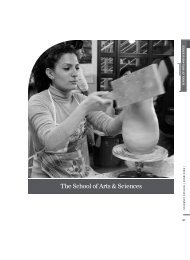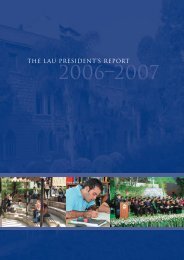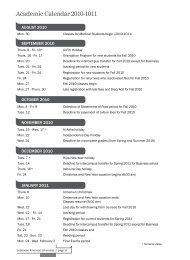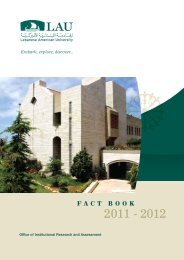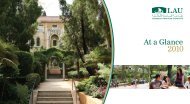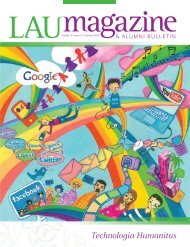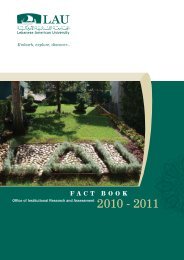academic-catalog2011.. - LAU Publications - Lebanese American ...
academic-catalog2011.. - LAU Publications - Lebanese American ...
academic-catalog2011.. - LAU Publications - Lebanese American ...
You also want an ePaper? Increase the reach of your titles
YUMPU automatically turns print PDFs into web optimized ePapers that Google loves.
Department of Computer Science and Mathematics<br />
C. Hardware and Networks<br />
CSC731<br />
High Performance Computer<br />
Architecture<br />
3<br />
CSC732 ULSI Testing 3<br />
CSC733 Embedded Systems 3<br />
CSC734 Advanced Computer Networks 3<br />
CSC736 Networks Security 3<br />
CSC737<br />
Pervasive Computing and Wireless<br />
Networking<br />
3<br />
D. Software Engineering<br />
CSC791 Advanced Software Engineering 3<br />
CSC792<br />
Object-Oriented Software<br />
Engineering<br />
3<br />
CSC793 Software Testing and Analysis 3<br />
CSC794 Software Quality Assurance 3<br />
CSC795 Safety-Critical Systems 3<br />
CSC796 Human–Computer Interaction 3<br />
CSC788<br />
Advanced Topics in Computer Science<br />
(in any of the four concentration<br />
areas; may be repeated)<br />
Mathematics programs<br />
BACHELOR OF SCIENCE (B.S.)<br />
IN MATHEMATICS<br />
MISSION<br />
The mission of the Mathematics Program is to<br />
offer quality and broad education in mathematics,<br />
supported by a foundation in the liberal arts. The<br />
program aims at providing its graduates with the<br />
knowledge and skills to teach at all school levels,<br />
and to pursue higher degrees in mathematics<br />
and other related fields.<br />
EDUCATIONAL OBJECTIVES<br />
The proposed curriculum provides the students<br />
with a strong background in the skills of logic,<br />
reasoning, critical thinking, and technology. More<br />
particularly, the curriculum:<br />
1. Covers the traditional aspect of a<br />
mathematics major and supplements<br />
the students with courses covering<br />
contemporary mathematical topics<br />
2. Offers a combination of pure and applied<br />
mathematics<br />
3. Permits the students to obtain a broad<br />
exposure to those fields of mathematics<br />
that are useful in the physical sciences,<br />
engineering, and others<br />
3<br />
4. Provides specific courses designed for<br />
students who plan to become teachers of<br />
mathematics<br />
5. Provides the appropriate mathematical<br />
background for students who wish to<br />
pursue graduate studies in mathematics<br />
or other related fields.<br />
LEARNING OUTCOMES<br />
Students who successfully complete the mathematics<br />
major will be able to:<br />
1. Exhibit an understanding of the nature of<br />
mathematics.<br />
2. Reason with abstract concepts.<br />
3. Follow complex mathematical arguments<br />
and develop mathematical arguments of<br />
their own.<br />
4. Understand and assess mathematical proofs<br />
and construct appropriate mathematical<br />
proofs of their own.<br />
5. Communicate mathematical ideas, proofs<br />
and conclusions successfully.<br />
6. Understand the branches of mathematics<br />
and how they are related.<br />
7. Demonstrate knowledge of essential areas<br />
in mathematics such as algebra, analysis,<br />
and probability and statistics, with the<br />
opportunity to become acquainted with<br />
the fields of number theory, mathematical<br />
logic, combinatorics, geometry and<br />
topology.<br />
8. Demonstrate knowledge of applied<br />
mathematics such as dynamical systems,<br />
numerical analysis and graph theory.<br />
9. Use their understanding of some of the<br />
more advanced ideas within mathematics<br />
development of their capability for working<br />
with abstract concepts.<br />
10. Perform mathematical computations using<br />
a computer package when appropriate.<br />
11. Work effectively in a professional workplace<br />
related to mathematics or in a graduate<br />
program.<br />
CURRICULUM REQUIREMENTS<br />
The Program requirements consist of a minimum<br />
of 92 credits. The major core requirements<br />
consist of 9 mathematics courses (27 credits),<br />
6 additional mathematics courses (18 credits)<br />
to be chosen from a list of elective courses, one<br />
course in computer science (3 credits), and 2<br />
courses chosen from a list of restricted electives<br />
(6 credits), and 4 credits of free electives.<br />
ACADEMIC CATALOG [ 2011-2012 ] SCHOOL OF ARTS AND SCIENCES<br />
109



